Blog Post
‘The careless people’: The dark, real-life inspiration behind ‘The Great Gatsby’
By Jonathon Van Maren
Last week my wife and I headed up to Lake Huron for a few days, and I finally had the chance to sit down and read a few books cover to cover. I’d been intending to revisit The Great Gatsby, which has been reproaching me from my night table, for some time. When I resurfaced a couple of hours after opening F. Scott Fitzgerald’s masterpiece, I felt a bit breathless. I’d remembered the descriptions of the parties and Gatsby’s vast wealth and Tom’s cruelty. But I’d forgotten just how dark the entire thing was—especially the parties, and especially considering Fitzgerald’s own very premature death.
Fitzgerald describes the buoyant beginnings of these parties perfectly. “The bar is in full swing, and floating rounds of cocktails permeate the garden outside, until the air is alive with chatter and laughter, and casual innuendo and introductions forgotten on the spot, and enthusiastic meetings between women who never knew each other’s names.” The lights and the champagne sparkle, the guffaws bubble up easily, and everything seems, for a brief moment, to be precisely as it should be. “In his blue gardens men and girls came and went like moths among the whisperings and the champagne and the stars.”
Fitzgerald writes like a booze-hound. The drinks make the stars brighter, the guests wittier and more beautiful, the laughter louder and better. The sensations, while being dulled, at first feel more acute. There is a moment—and he describes this in several of his novels—where he can sense the evening peaking, that moment where he is fully convinced that one more cocktail will achieve the pinnacle and all will be perfect. It is at that moment, with that drink, where it all gives way to drunkenness. The booze promises an ecstatic evening, lets him glimpse it, and then snatches it all away. Better luck next time.
READ THE REST OF THIS COLUMN AT THE UTOPIAN IDIOTS








